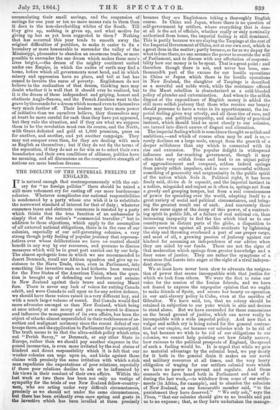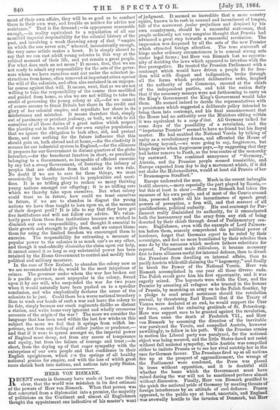THE DECLINE OF THE IMPERIAL FEELING IN ENGLAND.
IT is natural enough that contemporaneously with the out- cry for "no foreign politics" there should be raised a still more vehement cry for casting off our more burdensome colonies. Whatever complicates our national responsibilities is condemned by a party whose one wish it is to substitute the narrowest standard of interest for that of duty; whatever consumes taxes and obstructs commerce is resisted by a party which thinks that the true function of an ambassador is simply that of the nation's "commercial traveller ;" but in addition to these objections, which apply to the assumption of all external national obligations, there is in the case of our colonies, especially of our self-governing colonies, a very strong though petty feeling of popular jealousy that represen- tatives over whose deliberations we have no control should benefit in any way by our resources, and presume to discuss measures which will be in great part carried out by our help. The almost apologetic tone in which we are recommended to desert Denmark, recall our African squadron and give up re- sistance to the Slave Trade, rises, even in Parliament, into something like invective such as had hitherto been reserved for the Free States of the American Union, when the ques- tion is brought up of defending our brothers and cousins in New Zealand against their brave and cunning Maori foes. There is never any lack of voices for cutting Canada adrift, and were Canada to call upon us for any active defence, we should have these voices raised in a very different key, and with a much larger volume of sound. But Canada would find more advocates amongst us than New Zealand, which being at once utterly at our mercy and yet empowered to discuss and influence the management of its own affairs, has been the object of attacks almost unparalleled in their recklessness of as- sertion and malignant acrimony since the recent defeat of our troops there, and the application to Parliament for pecuniary aid. The truth seems to be that the ultra-selfish policy which cries out "Perish Savoy," or Denmark, or any other State in Europe, rather than we should pay another sixpence in the pound income-tax, is even more irritated by the real claims of kindred and direct responsibility which it is felt that our -weaker colonies can urge upon us, and kicks against those claims with precisely the same irritation with which a rich man repudiates the expectations of poor relations, especially if those poor relations decline to ask or be influenced by his views in their conduct of their own affairs. Within the Last week or two there has been not only no vestige of sympathy for the trials of our New Zealand fellow-country- men, who are acting under very difficult circumstances, precisely as we should act under the same circumstances, but there has been evidently even more spring and gusto in the inventive which has been levelled at them precisely because they are Englishmen taking a thoroughly English course. In China and Japan, where there is no question of self-government by settlers, where everything that is done at all is the act of officials, whether really or only nominally authorized from home, the imperial feeling is still dominant. This is partly because we are slaying the Taepings at the cost of the Imperial Government of China, not at our own cost, which is a great item in the matter; partly because, so far as we do pay for what is done there, no one assumes the power to override the will of Parliament, and to discuss with any affectation of responsi- bility how our money is to be spent. That is a great point : and therefore though there is not, and never has been, one- thousandth part of the excuse for our hostile operations in China or Japan which there is for hostile operations in New Zealand, the slaughter of Taepings is described as a merciful and noble work, while the resistance offered to the Maori rebellion is characterized as a cold-blooded policy of plunder and extermination. And when to the selfish disgust at the expenditure of English money is added the still more selfish jealousy that those who receive our bounty should presume to have a voice in its apportionment, the im- perial feeling gives way utterly, and all those ties of race, and language, and political sympathy, and similarity of practical instinct, which should bind us most closely to our colonies, are turned into direct causes of disgust and alienation.
The imperial feeling which is sometimes thought so selfish and ambitious,—and which of course often may be and is so,— rarely declines on a large scale, except from the growth of a deeper selfishness than any which is connected with its rise and extension. The popular delight in widespread influence and far-reaching government, though it may often take very selfish forms and lead to an unjust policy of aggrandizement and conquest, seldom indeed springs from purely selfish impulses, and is never successful without something of generosity and magnanimity in the public spirit of the nation which feels it. Political right, it has been finely said, derive de la capacite, and the imperial instinct in a nation, misguided and unjust as it often is, springs not from a greedy and grasping temper, but from a real consciousness of power for spreading over the world, adapting itself to a great variety of social and political circumstances, and bring- ing the greatest result out of each. And conversely there are few surer signs of the decay of this power, of a contract- ing spirit in public life, of a failure of real national via, than increasing incapacity to feel the ties which bind us to our countrymen in distant parts of the globe, a disposition to insure ourselves against all possible accidents by lightening the ship and throwing overboard a part of our proper cargo, and most of all, a growing passion of jealousy against our kindred for assuming an independence of our advice when they are aided by our funds. These are not the signs of that moderation which springs from greater knowledge and a finer sense of justice. They are rather the symptoms of a weakness that bursts into anger at the sight of a rival indepen- dent strength.
We at least have never been slow to advocate the resigna- tion of power that seems incompatible with that justice for which we look from others. We were the first to raise our voice for the cession of the Ionian Islands, and we have not feared to express the unpopular opinion that we ought to make friends of Spain, and secure her hearty co-operation in our anti-slavery policy in Cuba, even at the sacrifice of Gibraltar. We have said, too, that no colony should be retained in subjection to our yoke which is able and desires to stand alone. But we have contended for these concessions on the broad ground of justice, which can never really be incompatible with a wide imperial policy. And now that a vulgar and selfish cry is being raised for the general contrac- tion of our empire, not because our colonies wish to be rid of us, but because we wish to be rid of our obligations to our colonies, we cannot help pointing out how fatally narrow, how ruinous to the political prospects of England, the spread of such a feeling would be. It is urged that while we gain no material advantage by the colonial bond, we pay dearly for it both in the general drain it makes on our naval and military resources at all times, and the very heavy obligation of waging for our settlers colonial wars which we have no power to prevent and regulate. And these counsels we have heard both in Parliament and out of it during the last week,—to withdraw from some of our settle- ments (in Africa, for example), and to abandon the colonists of New Zealand, as one honourable member said, " to the punishment they have deserved." " We only ask," says the Times, " that our colonies should give us no trouble and put us to no expense ; that, as they have undertaken the manage- political and military measures. the Prussians from dwelling on internal affairs, then to- In the case of New Zealand, to abandon the colony now as pacifyAustria whilestill claiming the " hegemony," and finally we are recommended to do, would be the most iniquitous of to break the Power of the National Yerein. Herr von, crimes. The governor under whom the war has broken out Bismark accomplished in one year all those diverse ends.. is a pacific governor, most unpopular in the colony, forced The Polish revolt gave him his first opportunity, and it was upon it by our will, who suspended the war for two years eagerly seized. The bayonets were with the Czar, and the when it would naturally have been pushed on to a speedier Premier by arresting all refugees who trusted in the honour conclusion, and who emphatically declares the cause of the of Prussia, by marching an army on to the Polish frontier, by colonists to be just. Could there be a worse national treachery a pledge to send armed assistance should the revolution than to -wash our hands of such a war and leave the colony to prevail, by threatening Earl Russell that if the Treaty of its fate, simply because our crack regiments dislike so distant Vienna were declared at an end, he would support the Czar a station, and write home-very ignorant and wholly erroneous by force, earned the enduring gratitude of St. Petersburg.. accounts of the origin of the war ? The more we consider the Here was support sure to be granted against the revolution, language that has been used within the last few weeks on this and then came the death of Frederick VII., and Herr subject the more we feel that it springs from selfish im- von Bismark by assuming the direction of the inevitable potence, not from any feeling of either justice or prudence,— war paralyzed the Verein, and compelled Austria, however and that if it were to spread amongst us, the imperial power unwillingly, to follow in his path. With the Prussian armies. of England must decay, not from any access of temperance in motion the Liberal party was paralyzed, for the national and equity, but from the failure of courage and trust ;—in object was being secured, and the little States dared not resist short, from the drying up of that eager sympathy with the without full national sympathy, while Austria was compelled enterprises of our own people and that confidence in their either to imitate Prussia or to see her rival outstrip her in the English uprightness, which r-e the springs of all healthy race for German favour. The Prussians fired up as all nations. national genius for empire, and with the loss of which great fire up at the prospect of aggrandizement, the wrongs of races shrink back into nations, and nations into petty States. the Parliament were condoned, the Press was placed































 Previous page
Previous page